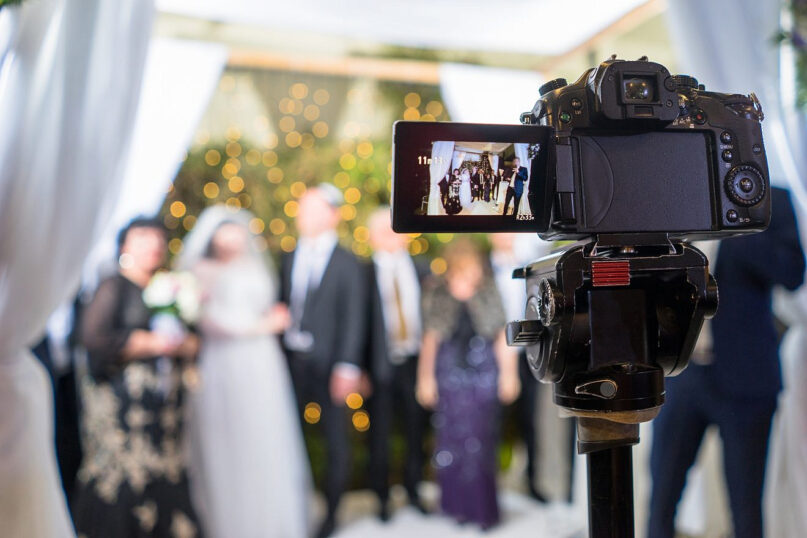
Times have changed. Conservative Judaism no longer sees intermarriage as a broad “threat” to Jewish survival, and the movement’s rabbis want to engage interfaith couples in “meaningful ritual ways” in synagogues and homes. But Conservative rabbis should not officiate at interfaith weddings “at this time.”
That’s according to a new report by a standards working group of the Rabbinical Assembly, the nearly 125-year-old international association of Conservative rabbis.
The 12 rabbis in the group spoke with nearly 200 Conservative rabbis in 10 “group listening sessions” and dozens of one-on-one conversations, per the report.
“Fifty years after the RA formally adopted standards that prohibited members from officiating at interfaith wedding ceremonies, our connections to these families and understanding of their roles in our communities have changed significantly,” the report states.
Many North American Conservative congregations include interfaith families who are raising Jewish children and “frequently” playing leadership roles, it adds. “This reality did not exist when the RA standards were implemented in the 1970s, at a time when intermarriage was viewed broadly as a ‘threat’ to Jewish survival.”
The report aims to move “beyond a binary discussion about Jewish identity and marriage and towards the countless opportunities to welcome and engage interfaith families in the beauty and meaning of Jewish community and practice.”
It adds that Conservative rabbis ought to “fully embrace interfaith couples through their pastoral approach and through updated policies.”
’Archaic’ prohibitions
In the 1970s, rabbis were thought to have authority, but it turned out that they “failed to dissuade Jewish community members from intermarrying.” Instead, per the report, they alienated many families that might otherwise participate in Conservative Jewish life.
“Today, rabbinic authority is much more about trust and relationship,” per the report. “People don’t explore and evaluate their beliefs, practices and behaviors with a rabbi because they are convinced the rabbi is right—but because they believe the rabbi knows and cares about them and because they respect the rabbi’s knowledge base and commitments.”
The working group recommends that Conservative rabbis retire “the legacy of disapproval.” (A rabbi from the Midwest who was part of a listening session reported rarely officiating weddings “because of how normalized intermarriage is in their community, which has a small Jewish population.”)
Among the group’s specific guidance is to “fast-track” a Committee on Jewish Law and Standards review of “outdated” rabbinic responsa calling for disapproval of interfaith families, including “archaic, decades-old prohibitions” against congratulating engaged interfaith couples and their families and hiring professionals in an interfaith marriage.
Rabbis must be better trained to “shift from positions of disapproval and approval to fostering meaningful dialogue as they engage with couples and families.”
One rabbi who spoke to the working group appeared to want to do considerably more than move beyond approving or disapproving.
“I have been asked to officiate at interfaith weddings and every situation is different,” the rabbi told the group. “I would like the standard to change to give me latitude to figure out what is best.”
“I used to get requests as Hillel rabbi to officiate at intermarriages. Not now,” another said. “They know I don’t and it makes me irrelevant to my families. People are not ashamed. They just don’t tell me.”
Yet another rabbi who spoke to the group said, during a conversation about driving to synagogue on Shabbat and kosher utensils, that the movement risks objectifying interfaith couples.
“I am a child of exactly this and my father didn’t convert until 1999 and raised Jewish children and two rabbis,” the rabbi said. “These are human beings. Can we not speak about my parents in the same category as parking lots and pots and pans?”
International differences
It became clear to the working group that Conservative communities vary globally.
An Israeli Conservative rabbi told the group that “any change in the standards would be a disaster for the movement in Israel. It would cause a schism in our Assembly.”
A Latin American rabbi added, “There are already some who don’t see us as being ‘proper’ rabbis.” Those whom the rabbi marries want another wedding ceremony afterward with an Orthodox rabbi.
“If we were to permit intermarriage, then the Jewish public would see us as not being halachic,” the rabbi said.
PHOTO: Wedding
CAP: A Jewish wedding. Credit: Sarfoto/Shutterstock.








 Southern New England Jewish Ledger
Southern New England Jewish Ledger













